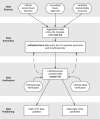A sub-national real-time epidemiological and vaccination database for the COVID-19 pandemic in Canada
- PMID: 34267221
- PMCID: PMC8282612
- DOI: 10.1038/s41597-021-00955-2
A sub-national real-time epidemiological and vaccination database for the COVID-19 pandemic in Canada
Abstract
The COVID-19 pandemic has demonstrated the need for real-time, open-access epidemiological information to inform public health decision-making and outbreak control efforts. In Canada, authority for healthcare delivery primarily lies at the provincial and territorial level; however, at the outset of the pandemic no definitive pan-Canadian COVID-19 datasets were available. The COVID-19 Canada Open Data Working Group was created to fill this crucial data gap. As a team of volunteer contributors, we collect daily COVID-19 data from a variety of governmental and non-governmental sources and curate a line-list of cases and mortality for all provinces and territories of Canada, including information on location, age, sex, travel history, and exposure, where available. We also curate time series of COVID-19 recoveries, testing, and vaccine doses administered and distributed. Data are recorded systematically at a fine sub-national scale, which can be used to support robust understanding of COVID-19 hotspots. We continue to maintain this dataset, and an accompanying online dashboard, to provide a reliable pan-Canadian COVID-19 resource to researchers, journalists, and the general public.
© 2021. The Author(s).
Conflict of interest statement
The authors declare no competing interests.
Figures




References
Publication types
MeSH terms
Grants and funding
LinkOut - more resources
Full Text Sources
Medical
Research Materials
Miscellaneous

